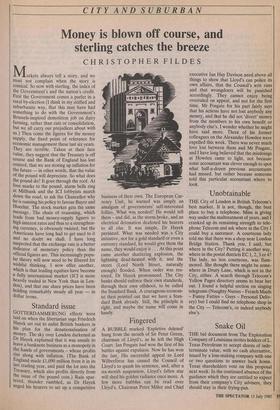Standard issue
GOTTERDAMMERUNG effects were laid on when the libertarian sage Friedrich Hayek set out to enlist British bankers in his plan for the denationalisation of money. The sky over London darkened as Dr Hayek explained that it was unsafe to leave a banknote business as a monopoly in the hands of governments – whose profits rise along with inflation. (The Bank of England made £1,090 million from it in its last trading year, and paid the lot into the Treasury, which also profits directly from the issue of the pound coin.) Rain spat- tered, thunder rumbled, as Dr Hayek urged his hearers to set up a competitive business of their own. The European Cur- rency Unit, he warned was simply an amalgam of governments' self-interested follies. What was needed? He would tell them – and did, as the storm broke, and an electrical detonation deafened his hearers to all else. It was simple, Dr Hayek persisted. What was needed was a City initiative, not for a gold standard or even a currency standard, he would give them the name, they would enjoy it. . At this point came another shattering explosion, the lightning dead-heated with it, and the street (Lord North Street, naturally enough) flooded. When order was res- tored, Dr Hayek pronounced. The City banks should enforce their own standards, through their own offshoot, to be called the Standard Bank. A courageous econom- ist then pointed out that we have a Stan- dard Bank already. Still, the principle is right, and maybe the name will come in handy.










































 Previous page
Previous page